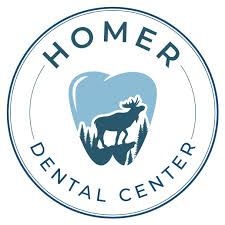EMERGENCY DENTISTRY
IN HOMER, AK
Dental emergencies can catch you off-guard, but they should never be ignored. Ignoring a dental emergency might increase the risk of permanent damage or the need for expensive treatments.
If you have a serious emergency, you want a caring dentist who can address your problem quickly. At Homer Dental Center, Dr. Adamson provides prompt dental care in a compassionate environment. All of the staff work hard to keep us comfortable and relieve pain during an urgent situation.
Learn more about dental emergencies or call our office for assistance! We provide a 24/7 care line for current patients.

What Is a Dental Emergency?
A dental emergency is any oral health problem that requires urgent care, meaning it shouldn’t wait until you can make an appointment in the next couple of days. While it’s difficult to give a comprehensive list of what constitutes a dental emergency, there are some common issues to be aware of.
Knocked-Out Teeth
A knocked-out tooth can be quite painful and needs immediate attention. If there is bleeding it is first important to get this to stop. If you can retrieve the tooth, hold it by the crown and rinse off the root of the tooth with water. Don’t remove any attached tissue as these help in securing the tooth back in place.
If it is not possible to reinsert the tooth, please put the tooth in a small container of milk or saline and visit your emergency dentist within one hour of the tooth being knocked out.
Broken and Chipped Tooth
If you experience chipped or cracked teeth it is important to seek help from an emergency dental office. If possible, save the broken tooth fragment and rinse your mouth and the broken pieces with warm water.
If there is bleeding, apply a piece of gauze to the area for roughly ten minutes to stop the bleeding. If there is excessive bleeding, consider visiting the emergency room. Your overall wellness is more important than a piece of tooth!
Broken Wires and Braces
If a wire breaks or sticks out of a bracket in your braces and pokes your cheeks, gum, or tongue, try and push it to a comfortable level. If you are unable to reposition it, add a cotton swab until you reach your dentist or orthodontist.
Do not try to cut the wire, as you might swallow it accidentally. Your emergency dentist will fix the issue as soon as possible to provide relief.
Abscess
An abscess is an infection that usually occurs around the root of a tooth or in the space between the gums and teeth. Abscesses are a serious condition that can damage the surrounding teeth and tissues.
If left untreated, the infection might spread to other parts of the body. It is best to visit your emergency dentist as soon as possible if you discover the signs of an abscess. Symptoms include pain or swelling in the gums or a toothache.
When Should I Call 911?
While some dental health issues need an emergency dentist, other situations need more immediate care that can only be offered in an emergency room. If you have a dental injury that’s causing excessive bleeding, you should head to the ER or call 911.
A broken jaw is also something that is best treated in an emergency room than at a dental office.
When in doubt, it’s better to seek an emergency room or call a professional for advice. If we don’t think we can address your dental issue, we will make a recommendation of where to go instead.
The Dangers of Not Addressing a Dental Emergency
Maybe a toothache starts to bother you, or you chip a tooth but it doesn’t seem too bad. You are busy with a deadline at work, or the kids have just started school, so you wonder if it is even worth going in to see the dentist.
If you decide not to do an emergency dental visit, the issue could get much worse.
You may experience:
If you decide not to get quick care from a dentist. Emergency dentistry is not just about alleviating current discomfort, but preventing the issue from affecting your overall health.
Toothache Treatment at Homer Dental Care
“Ouch! My tooth!” Sound familiar? When your tooth hurts, it can prevent you from eating, talking, and performing your daily tasks because of the pain. But what do you do for a toothache?
While some toothaches can be treated at home with simple at-home remedies, some might need the help of your dentist. Dr. Adamson provides toothache treatment, including emergency dental options.
Is Tooth Pain Serious?
Tooth pain ranges from mild to severe. In some cases, tooth pain is caused by a food item getting stuck between your teeth. In others, it’s caused by a severe infection or injury.
While not all tooth pain is serious, it’s always a good idea to pay attention to symptoms. If the pain is mild and goes away within a day or two, you may not need dental care, or you can at least wait and make an appointment.
If the pain is moderate to severe or doesn’t go away, you’ll want to see an emergency dentist for treatment.
Home Relief of Toothaches
Simple toothaches can be relieved with at-home care. Start by rinsing your mouth to clear it of debris and other matter that might be irritating your tooth. You can also try an over-the-counter pain reliever that may lessen the pain.
If you are unsure of what to do when you experience a toothache, contact your dentist for further information and tips.
Treating a Broken Tooth
When a tooth is broken or displaced, it can be repaired. If quick action is taken to care for your broken tooth, it should be easy to heal. If the tooth is knocked out, try to place the tooth back in its socket while waiting to see your dentist.
Next, rinse your mouth of any blood or other debris that might be in your mouth. It is also important to place a cold compress on the cheek near the injury for further relief from swelling and irritation. If you cannot place the tooth back in its socket, hold the dislocated tooth by the crown and place it in a container of warm milk, saline, or the person’s own saliva. Make sure to keep it in the solution until you arrive at the emergency room or dentist’s office.
Treating a Fractured Tooth
When a tooth is fractured, rinse with warm water and apply a cold pack or compress to the cheek to prevent swelling and irritation. You may also use ibuprofen to help control the swelling.
If it is a minor fracture, the tooth can be sanded or restored by our dentist if the pulp is not severely damaged. A fractured tooth needs prompt attention, so don’t wait before coming into our office for toothache care.
What Do I Do If I Have a Chipped Tooth?
A chipped tooth can really ruin someone’s day! Whether a tooth was broken from trauma to the face, or from biting into a hard candy—it is very often necessary to call an emergency dentist for treatment.
You’ll also want to follow a few simple steps while en route to the dentist.
- Ensure you treat any other injuries related to the chip. A chipped tooth may be more likely to occur on a tooth where dental work previously was done, or where there is dental decay. For serious injuries, call 911 or go immediately to the local emergency room.
- Stop any bleeding with a gauze or clean paper towel. You can rinse out your mouth with warm water or warm salt water. Depending on the severity of the injury, you may want to take some over-the-counter medication to reduce swelling and relieve pain.
- Recover any loose tooth fragments and store them in milk or water. Dr. Adamson may need to use the fragments while repairing the tooth, or use it as a reference for shape or color while restoring your smile.
A chipped tooth can be upsetting and unexpected, but Dr. Adamson and her team are here to restore your tooth.
Types of Chipped Teeth
A chipped tooth can be caused by many things, such as trauma to the face or even tripping and falling. There are different kinds of chips, which vary in severity.
- Loose or Moved Teeth: This is the most severe type of fracture, which is more likely to occur due to trauma. It occurs where the tooth sits inside the jaw bone. A dentist will be able to diagnose this accurately with an X-ray.
- Crown Fracture: This occurs in the part of the tooth above the gum line. A piece may chip off entirely, or there might be a fracture in the tooth.
- Root Fracture: This occurs when the tooth is broken below the gum line. The tooth may become dislodged or removed entirely and the dentist must recover any fragments that are still below the gum line.
Chipped teeth can be painful, especially if the chip is more severe. Don’t hesitate to contact our office for assistance.
You can watch this video to understand one method we use to treat a large crack or chip.
Cavities and Tooth Loss
Cavities are the number one cause of tooth loss, so it is important to know how to identify, prevent, and treat them.
Known as “tooth decay” in medical terms, cavities are the most common dental problem and the second most common health condition after the common cold. Fortunately, cavities can be discovered in the early stages and treated to avoid problems in the future.
The most common causes of cavities include:
- Improper Dental Hygiene
- A Diet High in Sugar and Starch
- Smoking
- Lack of Fluoride
- Chronic Diseases
- Medication That Limits Saliva Production
- Drug Use
- Genetics
While the best way to address cavities is to try and prevent them, many people still get cavities. Some people are more prone to cavities than others and may get cavities even with great dental hygiene.
Symptoms of Cavities
When cavities are forming, they can have symptoms that are difficult to notice. These symptoms include a slight sensitivity to cold and mild discoloration of the tooth surface.
As the cavity advances on the tooth’s dentin, a dark spot will appear and the tooth sensitivity will increase.
If a cavity affects the tooth’s pulp, it can become painful and you may experience bad breath and a bad taste in your mouth. If a cavity is not treated at this point, the tooth becomes prone to infection which can cause an abscess.
Cavity Prevention
While some people are more likely to get cavities than others, everyone can follow some simple tips to deter them. To prevent cavities you should:
- Brush at least twice a day and floss at least once a day
- Minimize the intake of products high in sugar and starch
- Visit the dentist every six months for a complete checkup
- Ask for a professional cleaning at least twice a year if you do not smoke (sooner if the tartar build-up is high) or three to four times a year if you smoke or chew tobacco.
Cavities are common, but they should not affect your busy life. Dr. Adamson can help with cavity prevention and removal.
Protect Your Teeth with Homer Dental Center
At Homer Dental Center, Dr. Adamson provides emergency dentistry treatment for issues like knocked-out teeth, toothaches, chipped teeth, and more. If you have a dental emergency or need help with a painful tooth problem, you can always give us a call.
We offer many same-day appointments, so you can return to your regular life right away. We even offer a 24/7 care line for current patients. Contact us by phone, text, or email for assistance or to book an appointment!
